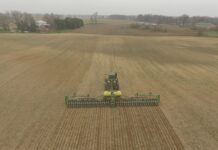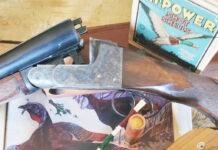I was at the Portersville Steam Show grounds a week or two ago to check out their annual Spring Gas Up. While there, I was hanging out in Wayne Cooper’s Trading Post with several other guys, when Stu Hindman asked me how long I’d been writing for Farm and Dairy. It occurred to me that this is the 20th year for Let’s Talk Rusty Iron, with the first effort appearing in the May 7, 1992 issue.
So, here I am, some 520 Rusty Iron columns later, still plugging away, and hopefully, interesting some of the readers some of the time. Since that first, rather lame offering, I’ve learned a lot about writing, both modern and past farming practices, and a vast amount of information about farm machinery, inventors, manufacturers and general history.
Beginnings
So, to commemorate the anniversary (and because I don’t really have a good subject for this week) I’ll present an “encore” presentation of that very first Rusty Iron, which was hammered out on an old portable typewriter:
“This column is a new venture for me. The Farm and Dairy has been looking for someone to write about old farm machinery and tractors, and asked me to give it a try. Tom Downing thoroughly covers the steam engine field, and Sunny Hull is chiming in with some good stuff on antique tractor pulling (author’s note: Sunny Hull wrote Confessions of a Pulling Junkie for several years, while Letting Off Some Steam by Tom Downing still appears regularly in Farm and Dairy).
“I’m not an expert on rusty iron, but I have accumulated some, and I’m interested in the history of the development and evolution of these machines. The column, then, will be about the antique tractor and implement-collecting hobby and farm equipment history, along with a little about the shows I attend.
Childhood
“I grew up on a farm in South Beaver Township, in Beaver County, Pennsylvania, during the late ’30s, the ’40s, and the early ’50s. As a kid, fascinated by machinery and tractors, I collected a thick scrapbook of tractor and machinery ads and sales literature. It’s a pity that scrapbook wasn’t saved.
“My earliest memory of a tractor goes back to about 1936 or 1937. My father, Sam Moore, and my uncle, Chuck Townsend, were partners in running a 300-acre farm belonging to my grandfather, Sherman Moore. For power, they had a team of horses, named Ted and Polly, and an old, gray, McCormick-Deering 10-20 tractor. I remember riding on the platform, holding on to a fender for dear life, while the old 10-20 jounced and vibrated along on steel lug wheels.
Obsession
“About 1939 the 10-20 disappeared and a used, red, Farmall F-30 on rubber tires took its place. I was crazy about this tractor and longed to drive it, but my legs were way too short to reach the clutch. At first, we pulled the old two bottom McCormick-Deering plow we’d used with the 10-20, but later got a three bottom, John Deere, truss frame plow, with rubber tires. The big Farmall and three bottom plow made quite a rig in our area, since our neighbors all had smaller, one or two plow tractors, or none at all.
“In the spring of 1941, the horses were sold, and to replace them, a Ford-Ferguson tractor, two bottom plow, and two row cultivator, was purchased new (author’s note: In my cousin, Peg Townsend’s, dairy, to which I didn’t have access in 1992, she says we got that first Ford tractor May 11, 1944).
Child-sized
“At last, a tractor I was sure I could handle! Immediately, I started hounding Dad to teach me to drive, and finally, he let me operate the little Ford. I was about 8 years old (actually ten) and was in heaven.
“About three years later (actually in the spring of 1946), the partners got another new Ford-Ferguson and sold the Farmall, so I never did get to drive it. Right after this, the partnership was dissolved and the land and equipment divided. Dad ended up with the newer Ford, which we used until he gave up farming in 1953
” Dad moved to Salem, where he managed the Salona Supply Company for many years, and I didn’t have much to do with farming during a career with the Ohio Bell Telephone Company. As I grew older, I developed a hankering to own an old tractor and, about five years ago, I got my first, a 1941 John Deere H.
Collection
“I now have 11 two-cylinder John Deere tractors, ranging in age from 1938 to 1956, in all stages of restoration, or lack thereof. I’ve also got a nice 1948 Case S tractor and a 1951 Oliver Cletrac crawler tractor that doesn’t run. I have four or five John Deere drag plows, a 1948 John Deere 12A combine, that I hope to use this summer to cut wheat, and a John Deere Number 5 tractor mower from the late ’40s that is used to cut weeds.
“I’ve almost completed restoring a 1930 Case-Osborne horse drawn mower, and have an Emerson-Brantingham-Osborne mower from the 1920s, and an International Harvester Company-Osborne mower from the late teens, that I plan to restore.
“A future column will explain why all three of these highly competitive companies built Osborne mowers. Next time, I’ll talk less about me, and more about Rusty Iron. If anyone has read this far, and has a comment, suggestion, or question, please write in care of the Farm and Dairy“.
Now, at the ripe old age of 78, we’ll have to see if I can make another 10. However, if Janie Jenkins could do it, perhaps I can too.











